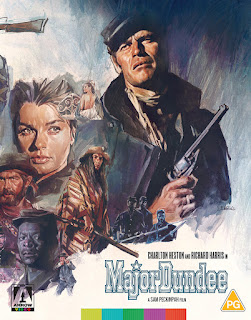Major Dundee
Cinematic evolution is rarely a slow, methodical process. Its history is dotted with mutant outliers whose success inspired copycat productions that multiplied like celluloid viruses, changing the business in fits and starts rather than planned genetic engineering. In the case of the Western, it took 1964’s A Fistful of Dollars to kickstart a new approach to the genre. But what if Leone’s film never made it the screen? Who would have filled in the evolutionary gap? The smart money is probably on Sam Peckinpah, whose Ride the High Country (1962) already served as a nostalgic send-off and fitfully revolutionary rebirth. But it was 1965’s Major Dundee that put his real potential – and self-destructive habits – on display.
Hollywood stalwart Charlton Heston stars as Major Amos Dundee, an arrogant disciplinarian with a chip on his shoulder who takes it upon himself to hunt down the survivors of an Indian attack, recruiting an ill-prepared unit of soldiers, civilian recruits and Confederate POWs (led by Richard Harris) into Mexico for personal revenge. The mission is plagued by power struggles, love triangles and personal demons as Dundee stubbornly refuses to concede defeat or compromise.
As a metaphor for America’s own political arrogance, Major Dundee is a truly prophetic piece of work, one that would only become more vivid with the onset of the conflict in Vietnam. But even disregarding the subtext, Peckinpah’s deals with personal flaws and character traits that wouldn’t become typical on U.S. screens for another five years. It’s still an adventure story, but it’s one that leads straight into the dark night of the soul, echoing Melville’s Moby Dick or Conrad’s Heart of Darkness. And, credit where credit is due, Heston goes for broke as Amos Dundee, a heartless bastard who might learn to respect but never love his fellow man (or woman).
Even working within the Hollywood system, Peckinpah’s film often feels like a personal confession, full of the sloppy genius we come to know only too well in later films like The Wild Bunch and Straw Dogs. The fight to retain his original vision of the film is well documented. Perhaps if left to his own devices, Peckinpah might have pushed the genre into a new direction all on his own. But sometimes it’s those working outside the system (like Leone) who have the advantage. And the success of the Dollars trilogy at least gave Peckinpah the second chance he may – or may not – have deserved.
Arrow Films’ 2-disc limited edition features the 136-minute extended version and the shorter theatrical release. As you might imagine for a title with this much behind-the-scenes drama, it’s loaded with special features, including three commentary tracks, a feature length documentary, interviews, visual essay, still, trailers, deleted scenes, fold-out poster and 60-page bound booklet. If you held out for the ultimate edition, congrats, your patience has paid off!




Comments
Post a Comment